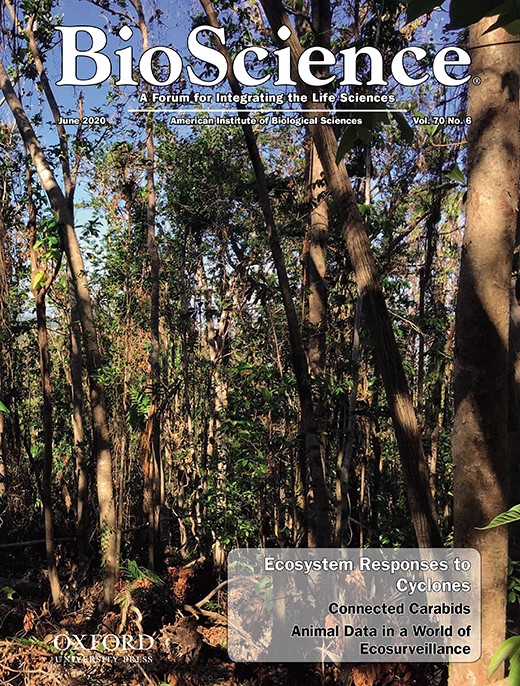Ripple et al (BioScience 2020) We appreciate the letters by Pouliot and colleagues (2020) and DellaSala and colleagues (2020) about our recent article “World scientists’ warning of a climate emergency” (Ripple et al. 2020). Pouliot and colleagues (2020) call for more scientists, teachers, and citizens to become engaged advocates, and we agree on the importance of this in that failure of these groups to engage confirms the dangerous status quo that has led to our climate emergency. DellaSala and colleagues (2020) correctly point out that climate policymakers are focusing primarily on fossil fuels and ignoring the great importance of protecting the massive carbon stores in nature, especially the primary forests found from boreal to tropical regions. In Ripple and col- leagues (2020), we stressed the importance of scientists speaking out, telling it like it is, and becoming agents for change. We also emphasized that pre- serving and restoring nature is one of the six critical steps for mitigating the climate crisis.
At the World Economic Forum in January of 2020, world leaders committed to plant one trillion trees (1t.org). While tree planting is needed, this proposal also makes for good headlines for those who might assume they can then continue with business as usual. Planting trees will do little by itself to solve our climate emergency. A trillion trees do not make a for- est. Forests are complex ecosystems that depend on rich biodiversity of all types of species, from trees to bacteria and fungi, to be productive sinks and resilient reservoirs for carbon. Besides planting trees and regenerating natural forest habitats, we urgently need to curb the rate of global deforestation. Nature-based solutions should become a major focus of climate policy. Forests could store substantially more carbon if allowed to grow and reach their ecological potential (Erb et al. 2018). Preserving our current primary forests and allowing secondary forests to grow for carbon storage would increase car- bon sinks in the near and intermediate future (proforestation; Moomaw et al. 2019). This would benefit biodiversity and watershed protection much more than planting a trillion trees that will take many decades to effectively remove atmospheric carbon dioxide (Law et al. 2018, Buotte et al. 2019).
Nature-based solutions span numerous ecosystems including forests, wetlands, grasslands, peatlands, mangroves, and others. Their biological processes include carbon uptake and storage in vegetation and soils. Therefore, active engagement with decision makers to instigate and incentivize regenerative land uses, reform food systems, and preserve and restore ecosystems is needed to increase carbon storage, while help- ing meet multiple policy goals (e.g., biodiversity, food security, water security, economic diversification). To make a difference at the spatial and economic scales necessary to achieve effective climate change mitigation, it is vital that nature-based solutions receive global backing from diverse groups of individuals and institutions, including scientists, Indigenous people, policymakers, businesses, and land owners. Given the potential co-benefits of focusing on nature to address climate change, we are confident they can gain broad-scale support, provided they are developed and implemented in an equitable way that promotes social and environmental justice. It is essential that a combined effort to reduce emissions from the energy and industrial sector, land use changes, and agriculture be combined with protect- ing natural systems from degradation and deforestation and restoring those that have been damaged. While plant- ing trees is a laudable effort, we need to bring greenhouse gas emissions close to zero as rapidly as possible and restore and nurture functioning ecosystems, which support all life on Earth and are a prerequisite for human existence.
The increasing threat of irreversible catastrophic climate change must compel immediate and immense action across all scales of society. Irreversible climate tipping points are too risky for us to continue conducting business as usual (Lenton et al. 2019). We agree strongly with Pouliot and colleagues (2020) that scientists, teachers, and citizens must boldly address climate change by taking the actions necessary to avoid the otherwise inevitable consequences. We need transformative change in how we mitigate and adapt to the climate crisis. This will entail massive personal, societal, and global political adjustments in how we function on our finite and now damaged planet in terms of energy, pollution, nature, food, economy, and human population issues (for an expanded discussion, see Ripple et al. 2020). These changes must be folded into the fabric of social and economic justice for all. We now need many more scientists to enter the science–policy– practice arena, because time is short. The transformations that we call for will at times be uncomfortable, unsettling, and strongly opposed by powerful economic and political forces. But, change can only follow when we first shift our vision to what is not only possible, but also critical for the future of Earth’s ecosystems and humanity’s survival.
Scientists can become signatories of the paper “World scientists’ warning of a climate emergency” at https://scientistswarning.forestry.oregonstate.edu/


